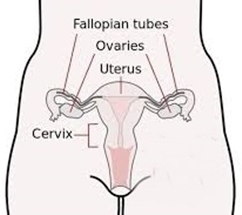Dysmenorrhea Symptoms, Period Pain Symptoms.
Dysmenorrhea normally pain concentrated in the lower abdomen, in the umbilical region or the suprapubic region of the abdomen. It is also commonly felt in the right or left abdomen. It may radiate to the thighs and lower back.
Period pain, dysmenorrhea often come with stress, depression, short tempered, upset and other psychological problems.
Symptoms often co-occurring with menstrual pain include nausea, vomiting, diarrhea or constipation, headache, dizziness, disorientation, hypersensitivity to sound, light, smell and touch, fainting and fatigue.[Reference 1]
About Dysmenorrhea, Period Pain, Period Cramps.
Symptoms of Dysmenorrhoea
Period pain symptoms , dysmenorrhea symptoms can include:
- pain low in the abdomen that can spread to the lower back and legs
- pain that is gripping or experienced as a constant ache, or a combination of both.
Typically:

- the pain normally starts when the period starts or just before.
- the first 24 hours is the most painful
- clots are passed in the menstrual blood.
Dysmenorrhoea can be associated with:
- headaches
- nausea and vomiting
- digestive problems, such as diarrhoea or constipation
- fainting
- premenstrual symptoms, such as tender breasts and a swollen abdomen, which may continue throughout the period
- pain continuing after the first 24 hours (this tends to subside after two or three days).
- acne, dark skin.
- swollen or tender breasts, engorgement of breast.
- feeling tired, lack of energy
- can't sleep
- upset stomach, disgursting, bloating.
- constipation before period or dring period, or diarrhea
- abdominal pain, headache or backache.
- bad appetite, food cravings.
- joint or muscle pain all over the body.
- depression, trouble with concentration or memory.
- anxiety, tension, irritability, mood swings, or crying spells